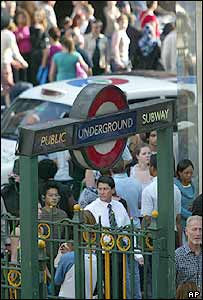
The Tube: 3m passengers a day
|
Not once, but twice, Londoners have faced chaos at the hands of suicide bombers and would-be attackers.
After the bloody 7 July attacks, policing was increased as a watchful, jittery public got on with the business of getting to work, getting on with life.
But following a second attempt at taking those lives on Thursday, questions are growing about security on the Tube, on London's buses.
How - commuters and politicians ask - can people be protected, without grinding to a halt a staggeringly-busy transport network?
The Tube alone carries 3m passengers a day, across 275 London Underground stations, according to figures from Transport for London, (TfL) the body responsible for the capital's transport system.
In addition, people pour in and out of the 36 Docklands Light Rail stations and cram on to trains at a web of over-ground stops.
Eight thousand red buses carry 6.3m passengers a day.
Call for checks
In the wake of both attacks, Prime Minister Tony Blair, Mayor Ken Livingstone and Metropolitan Police chief Sir Ian Blair said London should get back to business as normal.
On Friday, those businesses - in the shape of the London Chamber of Commerce and Asian Business Association - called for increased police and security steps.
They want devices which can detect passengers carrying explosives - like airport body scanners - installed on the Underground as well as increased stop-and-search powers for officers.
 |
 We are throwing everything we have got at it
We are throwing everything we have got at it

|
They admit only random checks may be practical, bearing in mind just how many travellers there are. That is before working out exactly what good, if any, random scanning would do.
Fears have also been raised by those at the very front of each Tube - individual drivers themselves have been reported as refusing to man trains.
Politicians have had their say - Liberal Democrats' Home Affairs spokesman Mark Oaten says the choice is between increased security and the ability for people to move around without huge disruption.
"It's a pay-off which people in London are debating in their minds," he says.
The media are raising issues. A correspondent from the Independent asked Mayor Ken Livingstone at a news conference: "Has the time not come for a fundamental rethink of security on the Tube?"
Answer in technology?
His answer was that airport-style security would "totally transform" everyone's journey to work with delays; stations are too small to do it; we do not have the right technology yet.
The British Transport Police patrol London's rail and Tube network, the Metropolitan Police the buses. There are 680 BTP police officers on the London Underground and 1,200 across the London area.
Both the BTP and TfL are keen to stress security on the Tube is a joint responsibility - between police, staff and members of the public.
"Working together we have got more of a chance of securing the system," says BTP spokesman Simon Lubin.
 |
LONDON TRANSPORT
3m Tube passengers a day
6.3m on buses
275 London Underground stations
8,000 buses
36 DLR stations
Source: Transport for London
|
Asked if the situation had gone beyond that now, he said: "No, people are playing their part and that's valuable in keeping the system safe."
"Since 7 July we have been doing everything we can. We are throwing everything we have got at it."
That involves increased Metropolitan, City of London and British Transport Police patrols, specialist units to deal with unattended packages, sniffer dog patrols, community support officers, and searching people under Section 44 of the Terrorism Act.
The Guardian Group - made up of the capital's various police organisations - meet regularly to look at security.
But neither the police nor TfL will be drawn on what measures are being looked at.
Commuters' fears
Neither is in favour of airport-style body scanners. It's impractical, and it's unworkable in the London Underground," says a TfL spokesman.
Both say technology does not yet provide another solution. Neither will comment on whether searches may be increased - they have already been stepped up since 7 July.
For commuters, the daily grind continued in Friday's rush hour.
They were worried but said they had no choice about travelling to work.
"Everyone's a bit shaken, there's a lot of nervous people out there," said one.
"But you have to get on with it.
"We are not going to let them win."

